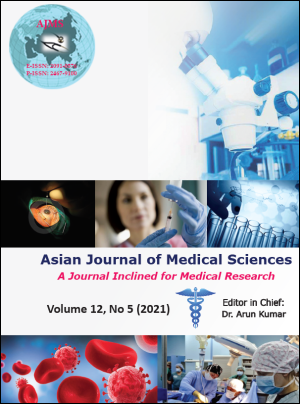To Correlate Serum Ferritin Levels with Clinical Outcome in Covid-19 Patients
Keywords:
COVID-19, Serum ferritin, cytokine stormAbstract
Background: COVID-19 a pandemic, affecting worldwide causing significant morbidity and to some extent mortality needs to be evaluated and urgently identify reliable predictors of disease severity and outcome. The fatal outcomes by COVID-19 are accompanied by cytokine storm syndrome. The cytokine storm is determined by serum ferritin.
Aims and Objective: To determine the role of Serum ferritin in assessing the severity and outcome of COVID-19.
Materials and Methods: A single-center, cross-sectional, observational study was conducted among SARS-CoV-2 infected patients from March 2020 to May 2020. The diagnosis was confirmed by real-time polymerase chain reaction (RT-PCR). Serum ferritin levels were compared with the treatment outcomes of COVID-19 positive patients.
Results: A total of 1977 COVID-19 patients were studied. The mean age was 43.89±15.58 years and had male preponderance of 61.56% of the total subjects. The mean serum ferritin levels among recovered and expired patients were 1225.6 ± 2502.91 ng/ml and 285.71 ± 391.99 ng/ml, respectively.
Conclusion: Serum ferritin was markedly increased in COVID-19 patients who could not survive as compared to the patients who finally recovered from the infection, proving it as a useful marker for assessing the severity of COVID-19.
Downloads
Downloads
Published
How to Cite
Issue
Section
License
Authors who publish with this journal agree to the following terms:
- The journal holds copyright and publishes the work under a Creative Commons CC-BY-NC license that permits use, distribution and reprduction in any medium, provided the original work is properly cited and is not used for commercial purposes. The journal should be recognised as the original publisher of this work.
- Authors are able to enter into separate, additional contractual arrangements for the non-exclusive distribution of the journal's published version of the work (e.g., post it to an institutional repository or publish it in a book), with an acknowledgement of its initial publication in this journal.
- Authors are permitted and encouraged to post their work online (e.g., in institutional repositories or on their website) prior to and during the submission process, as it can lead to productive exchanges, as well as earlier and greater citation of published work (See The Effect of Open Access).




